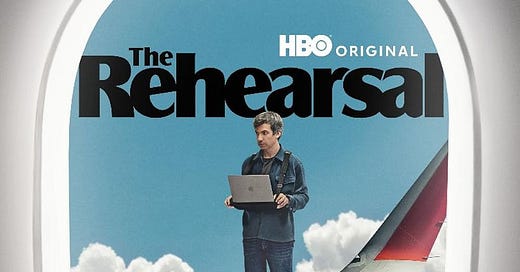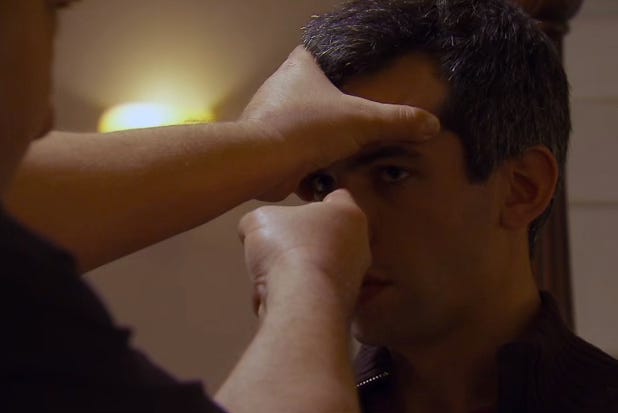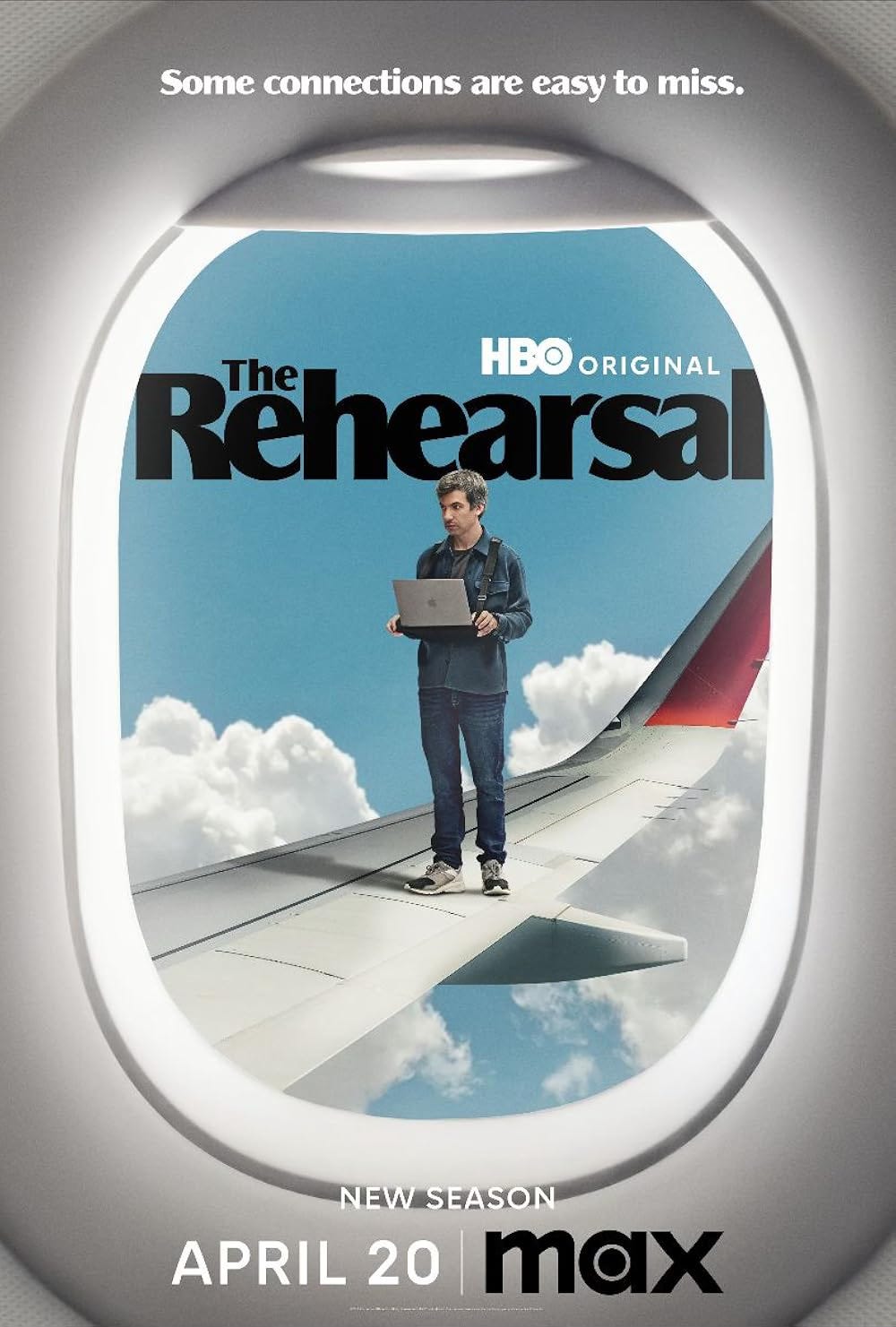After Season 2 of "The Rehearsal", Nathan Fielder has established himself as the boldest of creatives with an undefinable vision.
After finishing all of his work I'm feeling introspective...
SPOILERS FOR ALL NATHAN FIELDER’S STUFF.
If you asked someone to define entertainment, what would they say? Feeling entertained is something people are constantly trying to achieve. It sounds strange to say it in these terms, but our lives are made up of little moments where we entertain ourselves one way or another or allow others to entertain us. Of course, life is a compromise too, we can’t be entertained all the time, and we must all do things we don’t want to. We don’t want to go to work, brush our teeth, take out the bins and especially in Nathan’s case, have any form of potentially tricky human interaction. This point was explored in a more literal sense in his incredible, impossible to categorise show The Rehearsal in its first season. Nathan sought to help people rehearse for tough moments and situations in their life by creating sets and hiring actors to see how interactions or big life decisions may go in the most realistic way possible. While the show can often be hilarious there’s an eminence of sadness that runs through the themes he explores. Heavy, often deep-rooted emotion bubbles to the surface as he manages to almost accidentally stumble upon people and coax therapeutic revelations out of them and himself. There’s a particular episode in season one where Nathan is attempting to fast forward the experience of having a child for a woman who wants to be a mother. The child actor is a young boy who himself has an absent father and he eventually begins to believe that Nathan, who is acting as his father, is his actual father. You see Nathan lose composure here, is his series worth this confusing core memory for an impressionable young boy? He handles it well, but it surely opens debate as to what The Rehearsal is really achieving in the name of “entertainment”.
I first encountered Nathan Fielder very briefly, I used to work as a bookseller and my main job would be to endlessly pack and ship first editions all over the world. Sweat dripping down my forehead in the stuffy basement on a boiling summer’s day I’d repeat the same process again and again. One of the plus’s, however, was the fact that it had become so second nature to me I used to prop my phone on the eye level shelf ahead of me and watch tv all day. I went through a phase of absolutely loving Kroll Show an offbeat American sketch show which was quite hit and miss but mostly the former, created by Big Mouth’s Nick Kroll. The humour is vehemently stupid and over the top but always funny, mostly consisting of Nick Kroll and his many guest performances from modern top tier comedian’s. But there’s a sketch that stuck with and struck me when I first saw it. The sketch is called “Show us your songs Toronto” consisting of a fake talent show with bad performers and eclectic judges. But when an awkward, monotone voiced man appears on stage to perform “Nathan’s magic” it was like his brand of comedy had been lifted from somewhere completely alien. He asks a contortionist to pick a card as she randomly bends her body near him. Nathan Fielder plays this very straight and nervously stands around waiting to deliver his trick before whispering in her ear “you know you don’t have to do that, because it upstages me.”. It’s a subtle performance but in a way, it encapsulates everything his persona has become.
So where does Nathan Fielder stand as a performer? Is he always doing a bit? Is he as awkward as he presents himself? Is it a bit of both? His appearance in Kroll Show and general word of mouth convinced me to then go and watch Nathan for you, a show where he attempts to “help” struggling businesses with ridiculous, often counterintuitive schemes. This is what fully converted me to Nathan’s brand of comedy. The looseness of the show provides some of the funniest episodes of television I can remember, and I’d watched the entire four seasons in a matter of weeks. It lives in the same grey area as The Rehearsal both a faux documentary and hairbrained, pre-planned comedy. But because Nathan is willing to put himself in situations so excruciating he manages to mine gold from circumstances that seem to happen upon him by chance. For example, there’s a Bill Gates impersonator who becomes a recurring character in the series and by the end of the entire show him and Nathan go on a cross-Country Road trip to try and find his long-lost love. This is surprisingly sincere and sweet, once again skewering preconceptions the audience may have of the show. In my personal favourite episode Nathan plans to boost business for a real estate agent by repurposing her as “The ghost realtor” meaning through the help of a “medium” she can guarantee the house 100% ghost free. The whole thing culminates with him hiring an “exorcist” who expels a particular demon out of a bedroom. The scene is completely surreal but one of the funniest things you’ll ever watch, the realtor seems to fully believe the exorcist and begins weeping when he grabs her face and expels demons “causing her back pain.”. Nathan looks on flabbergasted until he whispers in the exorcists ear asking if he can help with his penis size. The exorcist clearly doesn’t know what to do here but doesn’t want to be seen as a fraud, so he agrees to help. He points angrily at Nathan and declares “If there’s a demon there... you know affecting… this man’s penis… male organs… making it smaller, whatever, if there’s any demon lodged in his penis right now, COME OUT IN THE NAME OF JESUS CHRIST!” Everyone in the room is taking what this man is saying seriously, and it is beautiful. There’s something almost sad about the nature of, in this case, a self-proclaimed position of power - this isn’t stupid, this guy’s an exorcist, this is normal. It goes back to my previous question surrounding the very notion of entertainment. It’s certainly funny but a lot of it is borderline unwatchable because we as humans recognise and wholly reject unconventional or uncomfortable social norms. You can see how The Rehearsal is birthed from the sludgy mess of human being’s strangest impulses we see so regularly in Nathan for you.
Nathan getting an exorcism in Season 2, episode 1, of Nathan for you, “Mechanic / Realtor”.
I’m getting to season 2 of The Rehearsal, bear with me…
In a potentially surprising next move Nathan Fielder teamed up with acclaimed one half of the Safdie brothers directing duo, Benny Safdie and Emma Stone for his surreal home-flipping series The Curse. Fielder plays Asher who with his wife Whitney, played by Stone are attempting to create an eco-friendly housing system in a poor community called Española. They are promoting this through a glossy and dystopian reality tv show with dogy producer Dougie, played by Benny Safdie. However, things go from bad to worse after a little girl in one of the nearby houses puts a “curse” on Asher and their insincere vision comes crashing down. The reason I’m mentioning The Curse is because despite being entirely fictionized and away from the docu style of Nathan for you and The Rehearsal they share the same DNA that makes the show so successful. The characters played by Fielder and Stone are morally bankrupt people who come from privilege and do not have the self-awareness to realise they are gentrifying and destroying a community for their own personal promotion. Stone’s character Whitney is the one pulling the strings and Asher is the simp husband who allows people, including Dougie to walk all over him. The series has a woozy and almost hallucinogenic effect that feels both like a reality show and something deeply removed from reality. The supernatural element of this potential curse asks the question: Is morality and circumstance internal or a product of our surroundings? I can see vast similarities in Nathan for you and The Rehearsal – in both, human interaction is seen as something that can be moulded and explored unconventionally. I guess what Nathan is trying to say in all his work is what is it that makes us proper people? How do we define what holds us back and is there a set of socially accepted norms we must abide to be considered “normal”?
So finally, after countless digressions The Rehearsal season 2.
In the second astonishing series which has elevated everything Nathan Fielder is good at, he attempts to find a solution to a seemingly huge problem in aviation safety. In typical Fielder style it’s completely off-piste, if you’ve seen series one, you’ll know how much of a departure it is from the more obvious situations he places his participants. Nathan has discovered that the number one cause of most major American airline crashes seems to be the lack or fear of clear communication in the cockpit. He’s found out that pilots are solitary creatures and it’s very hard to challenge the captain in the air, even if they’ve done something wrong – it could be your job on the line if you speak out of turn. So, to prove his theory, he recreates famous airline crashes in a simulator and directs increasingly bizarre situations involving pilots and their personal lives as well as actors to bridge the gap between opening up in the cockpit.
It's as strange and brilliant as it sounds, the show feels like it’s being pieced together before your very eyes and in a way, it is. Nathan always finds inventive ways to illustrate his larger point that we are all just trying to find connections, whether that be at work, at home, romantically or through friendships. In perhaps the strangest episode of the entire series and potentially his whole career he warns us “What you are about to see, may seem weird.” From here he reenacts the formative and subsequent years of Sully Sullenberger who famously saved a commercial airline from certain disaster by emergency landing in the Hudson River. Nathan is trying his hardest to get into the mind of someone who did the right thing when a dangerous situation occurred in the air. In the transcript Sully asks his colleague “got any ideas?” this is the best form of communication we’ve heard from a pilot thus far. But instead of a more standard psychoanalysis of Sully Nathan dresses up as a baby, builds a huge, disproportionate bedroom and gets a giant marionette puppet to change his nappy and breast feed him. It’s probably the boldest of bold moves I’ve ever witnessed in a television show. It sums up the appeal of his work, it could be the single most embarrassing thing I’ve ever seen an actor do on screen and it somehow works. By the end of the bit, he’s “lived” Sully’s life as described in his memoir and concludes that the 30 seconds Sully doesn’t respond before saying “got any ideas” is because he was listening to the chorus of “Bring me to life” by Evanescence. It’s a song about breaking away from the shackles imposed on yourself and everyone else. It’s a hilarious, genius moment, watching Nathan dressed up as Sully in a cockpit whacking this much memed chorus on some headphones at such a crucial moment in history. It’s the kind of fine balance of serious and hilarious he strikes throughout.
Nathan as Sully Sullenberger in The Rehearsal, Season 2, episode 3 “Pilot’s code”.
During the series he manages to recreate an entire airport, try and help a nervous pilot with his intimacy issues, create a fake popstar competition related to aviation and get his pilot licence all in six episodes ranging from 40 minutes to an hour. But there’s also more of an examination of Nathan here, his agreed status in society and popular culture is that he’s a “comedian”. In fact, he references this multiple times, he keeps saying to people “HBO is paying for all this” and that “it’s got to be a comedy.”. In many ways this show isn’t a comedy at all and if you weren’t on his wavelength, maybe Nathan isn’t very funny. He’s more of a thought experiment, a man willing to push boundaries and translate the language of comedy into something entirely different. There’s no-one on planet earth that does what he does, the only similarly introspective level of show you can loosely pair with The Rehearsal is Jerrod Carmichael Reality Show. Here, comedian Jerrod Carmichael gets people to film his life in every single detail even down to the hookups with strangers, cheating on his boyfriend and arguments with his mother over her refusal to accept him as gay. Both shows challenge that notion of entertainment whilst alluding to life’s greater mysteries and how much people are tied to their values.
I’m not going to sit here and explain the entire season because it’s honestly quite hard and you’d be better off just sitting down and binging it. However, I do want to mention the finale where Nathan provides us with the lesson that is the reason I’m writing this in the first place. It turns out, Nathan has been trying to get his pilots licence for over two years and by the end of the show he has very nearly succeeded. Only if he wants to get the theory through congress, he must show it in action... right? Nathan insists he can prove this by flying a commercial airplane but there are countless laws preventing him flying with real passengers. You must have 250 hours of flight time under your belt, and he would be unable to use an active airport. Not only this but all pilots must complete a “fit to fly” checklist which means you can’t have any mental issues which may deem you unsuitable or unstable. This is a sticking point for Nathan as he tells us how much he struggles with anxiety and there’s a distant idea throughout that he may be on the autism spectrum. So, to remedy this he gets a complex MRI that should show up if he has any problem that would deem him unfit to fly. Only if he wants to pull off his stunt he’s got a time crunch on his hands involving buying the old airline jet and other various complications. In the end he decides to go for it, he doesn’t know if he has any mental issues but deems himself fit to fly. Needless to say, it is a jaw dropping experience watching someone who has presented himself as so unserious flying a commercial airplane filled with actors whilst he attempts to communicate with another pilot he’s just met. Jets fly terrifyingly close to the plane to get shots while Nathan is flying and even the experienced pilot, he's with seems freaked out. It’s genuinely thrilling stuff and puts a bookend on the series that rings authentic yet strangely ambiguous. Nathan reminds us of all the people and strange stunts he’s pulled over the series, what this says about people and about himself. “No one is allowed in the cockpit if there’s something wrong with them. So, if you’re up here, you must be fine.”
After I’d finished the final episode, I turned to my girlfriend and said that I didn’t think I’d ever seen anything like that. I expressed how much I’d miss watching it. The series leaves you with a strange sense of melancholy, a longing and in fact appreciation of your luck if you do have people you love in your life. I didn’t think a “comedian” would make a concept that seems so stupid feel so profound – consider me entertained.






